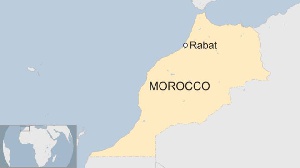The border between the arch-rivals has been closed since 1994, but Algeria had allowed some residents of the Moroccan frontier town of Figuig to cross into the date groves of Al-Arja, known to Algerians as the Laaroda oasis.
In recent days, Algeria has withdrawn that right, deploying soldiers to enforce the move.
"Everybody feels wronged," said Mohamed Jabbari, an unemployed 36-year-old who joined a protest in Figuig against the move.
"Agriculture is the only resource we have. There's no work here, no factories."
On Thursday, some 4,000 people -- around half of Figuig's population -- attended an angry demonstration against Algeria's decision.
Morocco's regional authorities organised a meeting to "examine possible solutions to mitigate the impact" of a decision they said was "temporary".
The Figuig oasis, sitting on a caravan route on the edge of the Atlas Mountains and the Sahara desert, was settled in ancient times.
Trade began to decline after the border was drawn in 1845, and diplomatic disputes between Algiers and Rabat soon turned Figuig into a dead end.
Before the border was drawn, the tight-knit Berber community had moved freely in the area.
Now, to reach relatives just a short distance over the sealed border, residents say they have to first take a plane to Algiers.
Algeria has justified the latest move by claiming farmers have failed to comply with regulations and that drug-trafficking gangs were operating in the area.
Figuig residents have strongly rejected those allegations.
"The expulsions are a political decision," said Mohamed El Jilali, head of a local association.
The expulsions coincide with a rise in tensions between the two countries in recent months over the disputed Western Sahara.
Rabat considers the territory to its south a sovereign part of the kingdom -- a position given Washington's seal of approval in the final days of the Trump administration.
Algeria has backed the Polisario Front which seeks independence for the territory.
Hundreds of kilometres (miles) away in Figuig, residents have more immediate concerns: their livelihoods.
The oasis, a three-hour drive to the nearest towns of Oujda and Errachidia, struggles to attract tourists.
That is despite its beautiful architecture and landscapes, which residents hope will eventually earn it a UNESCO World Heritage listing.
That leaves many residents reliant on date palms for a living.
Over the years, farmers have planted dates in areas beyond the wadi, or valley, that marks the border, taking advantage of the area's groundwater.
The more recently planted areas produce a better harvest than traditional gardens surrounded by adobe walls and irrigated by a complex network of hand-built canals, farmers say.
The area evacuated this week covers around 1,500 hectares (around 3,700 acres) and includes sought-after Aziza date palms.
Abdelmalik Boubekri, a Figuig farmer with chiselled features, said his date orchard had been his family's livelihood for three generations.
"Algeria and Morocco have let us farm with no problems and now we don't know who to turn to," the 71-year-old said.
He said he'd had to abandon 30,000 trees, some planted by his grandfather.
The years of work represented more than five million dirhams in value -- more than half a million dollars -- he said, with dates that sell for up to 150 dirhams a kilogramme.
Like others expelled from the Arja area, he claims a "historic right" to his land, brandishing a copy of a document dating to 1939.
Farmers from Figuig had already been forced to leave lands on the other side of the wadi.
The last evictions by the Algerian authorities took place in 1975, coinciding with the so-called Green March that saw thousands of Moroccans cross into Western Sahara to lay claim to the mineral-rich former Spanish colony.
Since then, Figuig has seen a wave of migration towards larger cities or Europe, emptying the oasis of half its inhabitants, their houses and gardens left empty and crumbling.
Farmer Abdelmajid Boudi, 62, is mourning the latest loss.
"Lots of palm trees have been abandoned and become too tall to harvest dates from," he said.
Africa News of Monday, 22 March 2021
Source: africanews.com

















